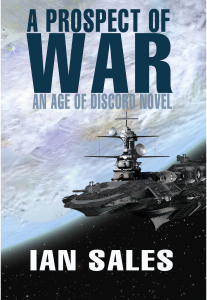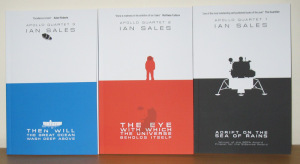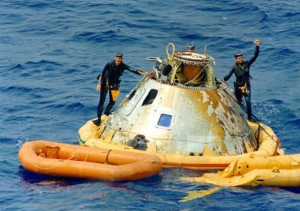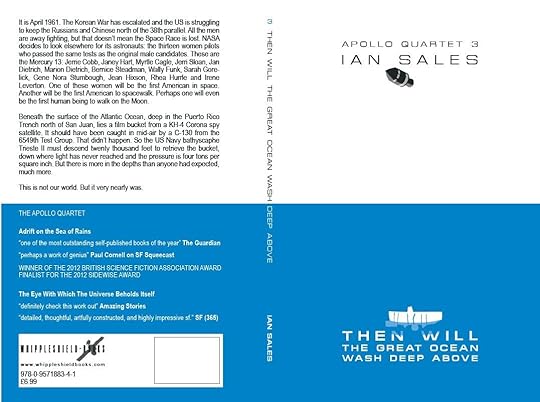Ian Sales's Blog
May 20, 2015
A prospect of space opera
I might have mentioned once or twice I have a new space opera out, A Prospect of War. And since books apparently don't market or sell themselves - big publishers have whole departments to do that, or so I've been told - I felt I'd better wibble on about it a bit. A Prospect of War will be officially launched as a signed limited hardback at Edge-Lit in Derby in July, but if you pre-order now you get a free ebook edition. Or you can buy the ebook straightaway, if you'd sooner have in that format. (ETA: The publisher has moved the book to Kindle: UK and US.)

So, a space opera. That's like with an empire. In space. With an, er, emperor. But A Prospect of War is not your typical space opera. Despite taking place in an empire that occupies some ten thousand worlds, it's all a bit low tech. I was going for a sort of Edwardian aesthetic when I wrote it, steel plates and polished wood, but these days I suspect it'll just be read as steampunk-ish. Which is not necessarily a bad thing.
The reason I designed such a universe was because I didn't want it to feel dated, no matter when a person read it. I wanted it to be hermetic, with no references to anything recognisable in the real world, or that could have been extrapolated from "current" science or technology. So all the computers are mechanical, and even artificial lighting is generated using the piezoelectric effect. And then there are the five handwavey devices which have made this an interstellar empire - topologic drive (FTL), charger (anti-gravity), directed-energy cannon (big shooty plasma-beamy things), power toroid (cheap energy), and force-curtain (useful for making sure your air doesn't escape in space). There's a back-story explaining how a relatively low-tech planet-bound civilisation ended up with these, and one day I may write a novella about it.
Then there's the narrative of A Prospect of War, which was partly modelled on that of an epic fantasy. Or at least, that was the original plan. There'd be a peasant hero, who'd find himself embroiled in an empire-wide plot bent on... hell, let's go for the obvious one: a plot to take the throne from the emperor. Your basic consolatory fantasy story. Why not? Except... what makes the peasant hero the, er, hero? If he's a nobody, what is it about him that results in him leading the fight to save the throne? There's no magic in A Prospect of War - I mean, that would be like polluting space opera...
Okay, perhaps a suitably science-fictional "magic" power might be okay. Like prescience. It worked for Paul Atreides, after all. True, he was also the son of a powerful noble, but you know what I mean. However, I wanted something a bit more original, and I think I managed it. In fact, this later proved only one of many serendipitous choices I made while I was writing - you know, where you write something because it seems like a neat idea at the time, and then later on in the narrative you realise you'd inadvertently foreshadowed something really cool.
In most epic fantasies, the narrative follows the peasant hero, getting to know him (it's pretty much always a "him") first, then showing how he picks up the various members of his gang, which he subsequently uses to defend the noble emperor. Or something. I decided to mix this up a little - the peasant hero would be your typical ingenu but he'd also be pushed and pulled by a couple of conspiracies. Which meant introducing some additional points of view as quickly as possible. This may have been a mistake. The opening chapters of A Prospect of War bounce around among four main characters, rather than focusing on the peasant hero. This means the novel has a somewhat steep learning curve - a situation not helped by my decision to try and avoid big fat lumps of exposition (although, to some extent, exposition was unavoidable, but I hope I kept it to a reasonable level).
The narrative of A Prospect of War, if it were plotted out, would look a bit like a map of a railway network. Sort of. The separate "tracks" of the story meet and cross and bounce off each other as the novel progresses, before eventually meeting up for the transition to the second book. Sometimes they're chasing a mystery, other times the direction is dictated by the answer to a mystery.
Just to make things a little more interesting, when I was designing the universe I decided that topologic travel would be measured in weeks, but time would have passed more slowly in the real universe - a "tmne-lag". On a logarithmic scale. So one week in the toposphere (the sort of hyperspace used by the topologic drive) equals eight days in the real universe; two weeks equals thirty-two days. And so on. A word of advice: never do this. It made working out the internal chronology of A Prospect of War, and its sequels, a complete nightmare. Especially when you have different groups of characters gallivanting about space.
All this focus on plot and the shape of the narrative doesn't mean I skimped on my cast. It was important to me the characters were as well-rounded as I could make them. The peasant hero, Casimir Ormuz, might be typical of the breed - although he's no special snowflake (well, perhaps a little bit) - but I hung the rest of the narrative on another four characters. Who, er, all happen to be women. Ormuz is a member of the crew of a tramp data-freighter. The ship's captain, Murily Plessant, represents one of the story's factions. Then there's the Admiral, who is secretly building up a force to defend the throne. Her lieutenant of intelligence, Rizbeka Rinharte, is instrumental in bringing Ormuz and the Admiral together. And finally there's Sliva Finesz, an inspector investigating financial irregularities high up in the government, who gets dragged into the whole thing. None of these, by the way, are precisely good or bad; it doesn't fall out into two neat little camps like that. And it gets especially mixed up in the second book, A Conflict of Orders.
The other element of the space opera I spent time developing was my empire's history. I wanted that sense of deep history you get in the best science fiction. I didn't quite go so far as putting together a family tree covering 1200 years of the empire's ruling dynasty... Well, okay, I started one, but I never finished it. But I did write notes covering some six or seven thousand years of history, most of which would never actually appear in the books. I actually made a start on an encyclopaedia, which I thought might eventually make a companion volume...
Next time, I might write about feudalism... in spaaaace.

So, a space opera. That's like with an empire. In space. With an, er, emperor. But A Prospect of War is not your typical space opera. Despite taking place in an empire that occupies some ten thousand worlds, it's all a bit low tech. I was going for a sort of Edwardian aesthetic when I wrote it, steel plates and polished wood, but these days I suspect it'll just be read as steampunk-ish. Which is not necessarily a bad thing.
The reason I designed such a universe was because I didn't want it to feel dated, no matter when a person read it. I wanted it to be hermetic, with no references to anything recognisable in the real world, or that could have been extrapolated from "current" science or technology. So all the computers are mechanical, and even artificial lighting is generated using the piezoelectric effect. And then there are the five handwavey devices which have made this an interstellar empire - topologic drive (FTL), charger (anti-gravity), directed-energy cannon (big shooty plasma-beamy things), power toroid (cheap energy), and force-curtain (useful for making sure your air doesn't escape in space). There's a back-story explaining how a relatively low-tech planet-bound civilisation ended up with these, and one day I may write a novella about it.
Then there's the narrative of A Prospect of War, which was partly modelled on that of an epic fantasy. Or at least, that was the original plan. There'd be a peasant hero, who'd find himself embroiled in an empire-wide plot bent on... hell, let's go for the obvious one: a plot to take the throne from the emperor. Your basic consolatory fantasy story. Why not? Except... what makes the peasant hero the, er, hero? If he's a nobody, what is it about him that results in him leading the fight to save the throne? There's no magic in A Prospect of War - I mean, that would be like polluting space opera...
Okay, perhaps a suitably science-fictional "magic" power might be okay. Like prescience. It worked for Paul Atreides, after all. True, he was also the son of a powerful noble, but you know what I mean. However, I wanted something a bit more original, and I think I managed it. In fact, this later proved only one of many serendipitous choices I made while I was writing - you know, where you write something because it seems like a neat idea at the time, and then later on in the narrative you realise you'd inadvertently foreshadowed something really cool.
In most epic fantasies, the narrative follows the peasant hero, getting to know him (it's pretty much always a "him") first, then showing how he picks up the various members of his gang, which he subsequently uses to defend the noble emperor. Or something. I decided to mix this up a little - the peasant hero would be your typical ingenu but he'd also be pushed and pulled by a couple of conspiracies. Which meant introducing some additional points of view as quickly as possible. This may have been a mistake. The opening chapters of A Prospect of War bounce around among four main characters, rather than focusing on the peasant hero. This means the novel has a somewhat steep learning curve - a situation not helped by my decision to try and avoid big fat lumps of exposition (although, to some extent, exposition was unavoidable, but I hope I kept it to a reasonable level).
The narrative of A Prospect of War, if it were plotted out, would look a bit like a map of a railway network. Sort of. The separate "tracks" of the story meet and cross and bounce off each other as the novel progresses, before eventually meeting up for the transition to the second book. Sometimes they're chasing a mystery, other times the direction is dictated by the answer to a mystery.
Just to make things a little more interesting, when I was designing the universe I decided that topologic travel would be measured in weeks, but time would have passed more slowly in the real universe - a "tmne-lag". On a logarithmic scale. So one week in the toposphere (the sort of hyperspace used by the topologic drive) equals eight days in the real universe; two weeks equals thirty-two days. And so on. A word of advice: never do this. It made working out the internal chronology of A Prospect of War, and its sequels, a complete nightmare. Especially when you have different groups of characters gallivanting about space.
All this focus on plot and the shape of the narrative doesn't mean I skimped on my cast. It was important to me the characters were as well-rounded as I could make them. The peasant hero, Casimir Ormuz, might be typical of the breed - although he's no special snowflake (well, perhaps a little bit) - but I hung the rest of the narrative on another four characters. Who, er, all happen to be women. Ormuz is a member of the crew of a tramp data-freighter. The ship's captain, Murily Plessant, represents one of the story's factions. Then there's the Admiral, who is secretly building up a force to defend the throne. Her lieutenant of intelligence, Rizbeka Rinharte, is instrumental in bringing Ormuz and the Admiral together. And finally there's Sliva Finesz, an inspector investigating financial irregularities high up in the government, who gets dragged into the whole thing. None of these, by the way, are precisely good or bad; it doesn't fall out into two neat little camps like that. And it gets especially mixed up in the second book, A Conflict of Orders.
The other element of the space opera I spent time developing was my empire's history. I wanted that sense of deep history you get in the best science fiction. I didn't quite go so far as putting together a family tree covering 1200 years of the empire's ruling dynasty... Well, okay, I started one, but I never finished it. But I did write notes covering some six or seven thousand years of history, most of which would never actually appear in the books. I actually made a start on an encyclopaedia, which I thought might eventually make a companion volume...
Next time, I might write about feudalism... in spaaaace.
Published on May 20, 2015 03:54
February 16, 2015
Second Edition Paperbacks Now in Stock
The second edition paperbacks of Adrift on the Sea of Rains, The Eye With Which The Universe Beholds Itself and Then Will The Great Ocean Wash Deep Above went on sale via CreateSpace a couple of weeks ago, but I now have copies for the Whippleshield Books website, should you prefer to purchase them directly.

I still have a few limited edition hardbacks of The Eye With Which The Universe Beholds Itself and Then Will The Great Ocean Wash Deep Above available, and until the release of All That Outer Space Allows I'm also running a special offer if you purchase all three second edition paperbacks, £12 for UK, £15 EU, and £18 for rest of the world - see here.

I still have a few limited edition hardbacks of The Eye With Which The Universe Beholds Itself and Then Will The Great Ocean Wash Deep Above available, and until the release of All That Outer Space Allows I'm also running a special offer if you purchase all three second edition paperbacks, £12 for UK, £15 EU, and £18 for rest of the world - see here.
Published on February 16, 2015 03:47
•
Tags:
apollo-quartet, hard-sf, ian-sales
September 14, 2014
Apollo Quartet Special Offer
At conventions, I usually offer copies of Adrift on the Sea of Rains, The Eye With Which The Universe Beholds Itself and Then Will The Great Ocean Wash Deep Above in paperback as a set for £10, and I've decided to extend that offer to my Whippleshield Books website. Including postage & packing to UK addresses. (It's a little more for EU addresses and rest of the world addresses.)
Yes, only £10 - including P&P, for Apollo Quartet 1, 2 and 3 in paperback. Buy it here. While stocks last.

Incidentally, I still have signed limited edition copies of The Eye With Which The Universe Beholds Itself and Then Will The Great Ocean Wash Deep Above available. They can also be ordered through the Whippleshield Books website.
Yes, only £10 - including P&P, for Apollo Quartet 1, 2 and 3 in paperback. Buy it here. While stocks last.

Incidentally, I still have signed limited edition copies of The Eye With Which The Universe Beholds Itself and Then Will The Great Ocean Wash Deep Above available. They can also be ordered through the Whippleshield Books website.
Published on September 14, 2014 09:36
•
Tags:
apollo-quartet, hard-sf, science-fiction
September 14, 2013
Apollo Quartet 3 cover reveal!
The pieces are slowly coming together, and while I hope to have copies of the third book of the Apollo Quartet, Then Will The Great Ocean Wash Deep Above, ready for World Fantasy Con at the end of October, things are getting a little tight. But here is the cover art.

Again, it's by Kay Sales, who did the cover for The Eye With Which The Universe Beholds Itself. It's also an excellent illustration of the story.
The blurb on the back reads:
It is April 1961. The Korean War has escalated and the US is struggling to keep the Russians and Chinese north of the 38th parallel. All the men are away fighting, but that doesn’t mean the Space Race is lost. NASA decides to look elsewhere for its astronauts: the thirteen women pilots who passed the same tests as the original male candidates. These are the Mercury 13: Jerrie Cobb, Janey Hart, Myrtle Cagle, Jerri Sloan, Jan Dietrich, Marion Dietrich, Bernice Steadman, Wally Funk, Sarah Gorelick, Gene Nora Stumbough, Jean Hixson, Rhea Hurrle and Irene Leverton. One of these women will be the first American in space. Another will be the first American to spacewalk. Perhaps one will even be the first human being to walk on the Moon.
Beneath the surface of the Atlantic Ocean, deep in the Puerto Rico Trench north of San Juan, lies a film bucket from a KH-4 Corona spy satellite. It should have been caught in mid-air by a C-130 from the 6549th Test Group. That didn’t happen. So the US Navy bathyscaphe Trieste II must descend twenty thousand feet to retrieve the bucket, down where light has never reached and the pressure is four tons per square inch. But there is more in the depths than anyone had expected, much more.
This is not our world. But it very nearly was.
When we get nearer to the publication date, I'll post a teaser from the first chapter.

Again, it's by Kay Sales, who did the cover for The Eye With Which The Universe Beholds Itself. It's also an excellent illustration of the story.
The blurb on the back reads:
It is April 1961. The Korean War has escalated and the US is struggling to keep the Russians and Chinese north of the 38th parallel. All the men are away fighting, but that doesn’t mean the Space Race is lost. NASA decides to look elsewhere for its astronauts: the thirteen women pilots who passed the same tests as the original male candidates. These are the Mercury 13: Jerrie Cobb, Janey Hart, Myrtle Cagle, Jerri Sloan, Jan Dietrich, Marion Dietrich, Bernice Steadman, Wally Funk, Sarah Gorelick, Gene Nora Stumbough, Jean Hixson, Rhea Hurrle and Irene Leverton. One of these women will be the first American in space. Another will be the first American to spacewalk. Perhaps one will even be the first human being to walk on the Moon.
Beneath the surface of the Atlantic Ocean, deep in the Puerto Rico Trench north of San Juan, lies a film bucket from a KH-4 Corona spy satellite. It should have been caught in mid-air by a C-130 from the 6549th Test Group. That didn’t happen. So the US Navy bathyscaphe Trieste II must descend twenty thousand feet to retrieve the bucket, down where light has never reached and the pressure is four tons per square inch. But there is more in the depths than anyone had expected, much more.
This is not our world. But it very nearly was.
When we get nearer to the publication date, I'll post a teaser from the first chapter.
Published on September 14, 2013 03:11
•
Tags:
apollo-quartet, science-fiction
August 30, 2013
September bargain
Starting today, and lasting until the end of September, I'm dropping the price of the paperback edition of Apollo Quartet 2 The Eye With Which The Universe Beholds Itself. Normally priced at £4.99 for UK purchasers, including postage and packing , the new cheaper price is £3.99, still including postage and packaging. This price change only applies to copies bought through the Whippleshield Books online shop.
Unfortunately, the prices for purchasers based in the EU and elsewhere in the world will remain the same.
Depending on how successful the discount is, I may decide to extend it for another month or so. If you don't have a paperback copy of The Eye With Which The Universe Beholds Itself, now's the time to get one. And don't forget that the paperback edition of Adrift on the Sea of Rains is also only £3.99 from the Whippleshield Books online shop.
Unfortunately, the prices for purchasers based in the EU and elsewhere in the world will remain the same.
Depending on how successful the discount is, I may decide to extend it for another month or so. If you don't have a paperback copy of The Eye With Which The Universe Beholds Itself, now's the time to get one. And don't forget that the paperback edition of Adrift on the Sea of Rains is also only £3.99 from the Whippleshield Books online shop.
Published on August 30, 2013 06:50
August 28, 2013
Adrift on the Sea of Rains: the podcast
An audio version of Adrift on the Sea of Rains has just been published by Starship Sofa - see here. I didn't really believe the story would work as a podcast but, with some careful editing by Adam Pracht and myself, I think we managed it. Go and check it out and you'll see what I mean.
However, we couldn't really have the narrator read out the glossary, and since that's part of the whole Adrift on the Sea of Rains reading experience, I've published it on the Whippleshield Books blog, both as a blog post and a downloadable PDF. See here.
However, we couldn't really have the narrator read out the glossary, and since that's part of the whole Adrift on the Sea of Rains reading experience, I've published it on the Whippleshield Books blog, both as a blog post and a downloadable PDF. See here.
Published on August 28, 2013 02:55
•
Tags:
apollo-quartet, science-fiction, whippleshield-books
July 1, 2013
ADRIFT ON THE SEA OF RAINS FINALIST FOR SIDEWISE AWARD
The judges for the Sidewise Award for Alternate History have announced the finalists for the 2012 award, and on the list of Best Short-Form Alternate History is Adrift on the Sea of Rains. The award was established in 1995 to recognise the best alternate history and takes its name from Murray Leinster’s 1934 story, ‘Sidewise in Time’.
The winner will be announced at the World SF convention, which this year is LoneStarCon 3 in San Antonio, Texas, on the weekend of 30 August 2013.
The winner will be announced at the World SF convention, which this year is LoneStarCon 3 in San Antonio, Texas, on the weekend of 30 August 2013.
Published on July 01, 2013 03:03
April 2, 2013
Adrift on the Sea of Rains wins BSFA Award
Sunday 31 April saw the awards ceremony for British Science Fiction Association Awards take place at EightSquaredCon, the annual UK Eastercon, in Bradford. Adrift on the Sea of Rains was one of six pieces of fiction short-listed in the best short fiction category.
And it won.
Here's a photo of the award:

The other winners were Jack Glass by Adam Roberts for best novel, the cover art of Jack Glass by Blacksheep for best artwork, and the World SF Blog for best non-fiction. Congratulations all.
And it won.
Here's a photo of the award:

The other winners were Jack Glass by Adam Roberts for best novel, the cover art of Jack Glass by Blacksheep for best artwork, and the World SF Blog for best non-fiction. Congratulations all.
Published on April 02, 2013 13:57
•
Tags:
bsfa-award, science-fiction, whippleshield-books
January 21, 2013
Adrift on the Sea of Rains shortlisted for the BSFA Award
Excellent news! [Adrift on the Sea of Rains] has been shortlisted for the BSFA Award in the short fiction category.
It’s an especially strong and diverse shortlist this year, with stories by Aliette de Bodard, Tim Maughan, Rochita Loenen-Ruiz, China Miéville and Chris Butler. [Adrift on the Sea of Rains] is one of two novella-length pieces of fiction on the list.
The BSFA Awards are one of the the premier UK awards for science fiction and fantasy. It has been presented annually since 1970. Members of the British Science Fiction Association are eligible to nominate works for the awards, and to vote on the shortlists. Attendees at the annual Eastercon can also vote on the shortlists.
It’s an especially strong and diverse shortlist this year, with stories by Aliette de Bodard, Tim Maughan, Rochita Loenen-Ruiz, China Miéville and Chris Butler. [Adrift on the Sea of Rains] is one of two novella-length pieces of fiction on the list.
The BSFA Awards are one of the the premier UK awards for science fiction and fantasy. It has been presented annually since 1970. Members of the British Science Fiction Association are eligible to nominate works for the awards, and to vote on the shortlists. Attendees at the annual Eastercon can also vote on the shortlists.
Published on January 21, 2013 01:15
•
Tags:
awards
December 22, 2012
New Review of Apollo Quartet 2
Another review of The Eye With Which The Universe Beholds Itself has appeared online, this time by Brian Baker of (SF) 365. He writes:
The Eye With Which… is a worthy sequel and impressive advance, a must-buy; if you don’t know Sales’s work, I thoroughly recommend it. It’s detailed, thoughtful, artfully constructed, and highly impressive sf.
The full review is here.
I have now made The Eye With Which The Universe Beholds Itself available for pre-order in the online shop. Though it says the book is in stock, that’s just the e-commerce package I’m using – it will not be available until January 2013.
Incidentally, I have PDF advance review copies for anyone who is interested. Email me at sales (at) whippleshieldbooks (dot) com, if you’d like to review The Eye With Which The Universe Beholds Itself.
The Eye With Which… is a worthy sequel and impressive advance, a must-buy; if you don’t know Sales’s work, I thoroughly recommend it. It’s detailed, thoughtful, artfully constructed, and highly impressive sf.
The full review is here.
I have now made The Eye With Which The Universe Beholds Itself available for pre-order in the online shop. Though it says the book is in stock, that’s just the e-commerce package I’m using – it will not be available until January 2013.
Incidentally, I have PDF advance review copies for anyone who is interested. Email me at sales (at) whippleshieldbooks (dot) com, if you’d like to review The Eye With Which The Universe Beholds Itself.
Published on December 22, 2012 23:32
•
Tags:
science-fiction, whippleshield-books
Ian Sales's Blog
- Ian Sales's profile
- 86 followers
Ian Sales isn't a Goodreads Author
(yet),
but they
do have a blog,
so here are some recent posts imported from
their feed.



